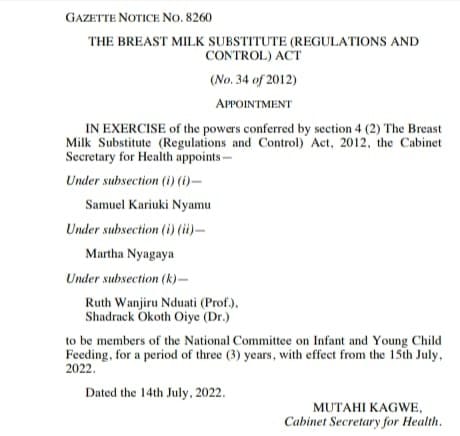Field Stories
In photos: Local shops enhance access to zinc and LO-ORS to improve child health in Kenya
June 24, 2024
WP_Term Object
(
[term_id] => 136
[name] => Blog Posts
[slug] => all-blog-posts
[term_group] => 0
[term_taxonomy_id] => 136
[taxonomy] => news-category
[description] => See what’s top of mind for our technical experts as they share the latest on cutting-edge nutrition research, policy updates, and implementation guidance.
[parent] => 2025
[count] => 137
[filter] => raw
)
Nutrition International’s Martha Nyagaya is appointed to Kenya’s National Committee on Infant and Young Child Nutrition
As the world observes World Breastfeeding Week, we celebrate our Kenya Country Director’s appointment to the National Committee on Infant and Young Child Nutrition in accordance with Kenya’s Breast Milk Substitute (Regulations and Control Act), 2012 and explore what the role means.
Posted on August 5, 2022
Breastfeeding saves lives. It is the optimal form of nutrition for infants and is one of the most effective interventions that provides both short and long-term health benefits for the mother and her baby. Adequate nutrition during the first 1,000 days of life provides an essential foundation contributing to child survival, brain development, healthy growth, wellbeing and global economic gains by supporting future successful outcomes in education, the workplace and lifetime earnings. Despite this, the aggressive marketing tactics that promote breastmilk substitutes continue to prevail and undermine efforts to improve and support early, exclusive and continued breastfeeding.
In 1981, Kenya was one of the first governments to vote in favour of adopting the International Code of Marketing of Breast–Milk Substitutes (the “WHO code”) at the World Health Assembly meeting. The WHO code, primarily targeted at governments and companies, aims to protect breastfeeding while regulating the high-pressure, misinformed advertising and marketing practices of breastmilk substitutes that undermine breastfeeding. Products that fall under the scope of the WHO code include infant formula, feeding bottles, artificial nipples and more. Since its inception, the WHO code has led governments around the world to reform, develop and enact policies and regulations that are guided by the code’s chief purpose and principles.
Three decades later, the Kenyan government, with technical assistance from various partners and stakeholders, enacted the Breastmilk Substitutes (Regulation and Control) Act, 2012 (BMS Act). Guided by the WHO code, the purpose of the act is to protect, promote and support breastfeeding by regulating the inappropriate marketing and distribution of breast milk substitutes. The act serves to create an enabling environment where breastfeeding is encouraged as the healthiest way to feed infants and young children and accurate and unbiased information about breastfeeding is disseminated to mothers and their families.

Under section 4(2) of the BMS Act, the Cabinet Secretary is required to establish a National Committee on Infant and Young Child Feeding, comprised of members selected from different governments and partner organizations. On July 14th, 2022, Hon. Mutahi Kagwe, Cabinet Secretary for the Ministry of Health in Kenya, appointed Martha Nyagaya to serve a three-year term on the National Committee. Martha is a nutrition specialist and brings 18 years of experience in the health sector to this appointment. As Nutrition International’s Country Director in Kenya, she leads program planning and development at the country level and manages relations with the Government of Kenya and other key stakeholders at the national and county level.
“Nutrition International is honored to take on this role,” Martha says of the appointment. “It demonstrates the confidence the government has in both myself and Nutrition International as we have supported a number of government efforts in developing policies, strengthening capacity and consolidating evidence to inform infant and young child nutrition programs and related legislation. This appointment gives us a higher advocacy platform to champion better health and nutrition for mothers and children. I am so inspired.”

“This appointment gives us a higher advocacy platform to champion better health and nutrition for mothers and children. I am so inspired.
—Martha Nyagaya, Country Director, Kenya
As part of the committee, Martha will advise the Cabinet Secretary on policies that should be adopted in relation to infant and young child nutrition. She will also assist in formulating regulations for the advertisement, promotion and labelling of breast milk substitute products.
While the BMS Act is a positive step for Kenya in reaching the World Healthy Assembly’s 2025 global nutrition target of increasing exclusive breastfeeding rates to 50%, the world still has a lot of work to do. As we celebrate World Breastfeeding Week, we continue to call upon governments, policy makers and donors around the world to develop legislation and increase investments in breastfeeding for a healthier generation in years to come.